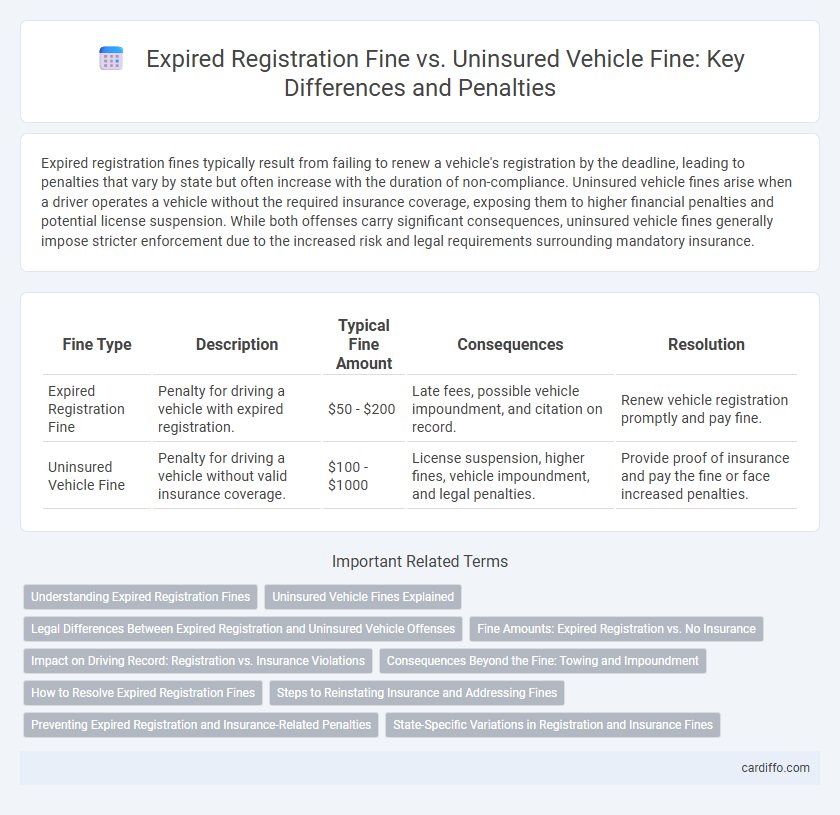Expired registration fines typically result from failing to renew a vehicle's registration by the deadline, leading to penalties that vary by state but often increase with the duration of non-compliance. Uninsured vehicle fines arise when a driver operates a vehicle without the required insurance coverage, exposing them to higher financial penalties and potential license suspension. While both offenses carry significant consequences, uninsured vehicle fines generally impose stricter enforcement due to the increased risk and legal requirements surrounding mandatory insurance.
Table of Comparison
| Fine Type | Description | Typical Fine Amount | Consequences | Resolution |
|---|---|---|---|---|
| Expired Registration Fine | Penalty for driving a vehicle with expired registration. | $50 - $200 | Late fees, possible vehicle impoundment, and citation on record. | Renew vehicle registration promptly and pay fine. |
| Uninsured Vehicle Fine | Penalty for driving a vehicle without valid insurance coverage. | $100 - $1000 | License suspension, higher fines, vehicle impoundment, and legal penalties. | Provide proof of insurance and pay the fine or face increased penalties. |
Understanding Expired Registration Fines
Expired registration fines are penalties imposed when a vehicle is driven without a current, valid registration, reflecting non-compliance with state motor vehicle laws. These fines vary by jurisdiction but typically increase with the length of time the registration remains expired, emphasizing the importance of timely renewal. Understanding these fines helps vehicle owners avoid unexpected costs and legal consequences associated with expired registration status.
Uninsured Vehicle Fines Explained
Uninsured vehicle fines impose significant penalties for driving without valid insurance coverage, often exceeding expired registration fines due to the heightened risk uninsured vehicles pose to public safety. These fines typically include hefty monetary charges, possible vehicle impoundment, and increased insurance premiums upon acquiring coverage. Law enforcement and insurance agencies strictly enforce uninsured vehicle fines to encourage compliance and protect all road users from financial liability in accidents.
Legal Differences Between Expired Registration and Uninsured Vehicle Offenses
Expired registration offenses typically incur fines due to failure to renew vehicle registration by the mandated date, reflecting administrative non-compliance with state motor vehicle laws. Uninsured vehicle fines result from driving without the legally required minimum insurance coverage, posing higher legal risks as this offense directly relates to financial responsibility and public safety regulations. Legal penalties for uninsured vehicles often include higher fines, license suspension, and potential criminal charges, whereas expired registration violations primarily lead to administrative fees and possible vehicle impoundment.
Fine Amounts: Expired Registration vs. No Insurance
Expired registration fines typically range from $100 to $250 depending on the state, reflecting the administrative costs of enforcement and vehicle verification. Uninsured vehicle fines are generally higher, often exceeding $500, because driving without insurance poses greater financial risks to others and results in stricter penalties. Both fines may increase with repeated violations, but uninsured vehicle penalties usually include additional consequences such as license suspension or vehicle impoundment.
Impact on Driving Record: Registration vs. Insurance Violations
Expired registration fines typically result in points added to the driving record, which can affect insurance premiums and driving privileges. Uninsured vehicle fines often carry harsher penalties, including higher fines, more points, and potential license suspension, significantly impacting the driving record. Both violations negatively influence insurance rates but uninsured vehicle offenses generally have a greater long-term effect on driving history.
Consequences Beyond the Fine: Towing and Impoundment
Expired registration fines often lead to vehicle towing and impoundment, causing additional fees and inconvenience beyond the initial penalty. Uninsured vehicle fines frequently result in mandatory impoundment and may require proof of insurance reinstatement before vehicle release. Both violations elevate legal risks, heighten financial burdens, and disrupt daily transportation due to potential loss of vehicle access.
How to Resolve Expired Registration Fines
To resolve expired registration fines, promptly renew your vehicle registration online or at a local DMV office, providing current proof of insurance and paying any outstanding fees. Submit any required documentation to prove the renewal date and avoid additional penalties or vehicle impoundment. In some cases, requesting a payment plan or contesting the fine with evidence of timely renewal can help reduce or dismiss charges.
Steps to Reinstating Insurance and Addressing Fines
Reinstating insurance after an expired registration fine requires immediately contacting your auto insurer to renew or obtain a new policy, then submitting proof of insurance to the Department of Motor Vehicles (DMV). Addressing an uninsured vehicle fine involves paying the penalty, showing valid insurance coverage, and filing an SR-22 form if mandated by your state DMV. Both processes may necessitate clearing outstanding fines and fees before vehicle registration can be reinstated.
Preventing Expired Registration and Insurance-Related Penalties
Maintaining up-to-date vehicle registration and insurance is essential to avoid costly fines and legal penalties. Regularly verifying registration expiration dates and insurance coverage status through official DMV portals or insurance providers helps prevent lapses that trigger fines, which often vary by state but can exceed several hundred dollars. Implementing automated reminders or digital alerts ensures timely renewals, minimizing risks of expired registration and uninsured vehicle fines while promoting compliance with state regulations.
State-Specific Variations in Registration and Insurance Fines
State-specific variations in expired registration fines and uninsured vehicle fines reflect diverse enforcement priorities and legal frameworks across the U.S. In states like California, expired registration fines can reach up to $250, whereas uninsured vehicle fines commonly exceed $500, emphasizing stricter penalties for insurance violations. Conversely, in states such as Texas, the expired registration fine might be comparatively lower, while uninsured vehicle fines include additional consequences like license suspension and vehicle impoundment, underscoring the emphasis on insured compliance.
Expired Registration Fine vs Uninsured Vehicle Fine Infographic

 cardiffo.com
cardiffo.com